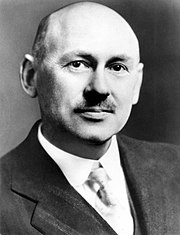Portal:Spaceflight/Selected biography/1

Robbert Hutchings Goddard (1882–1945) is considered to be one of the fathers of modern rocket propulsion. A physicist of great insight, Goddard also had a unique genius for invention. By 1926, Goddard had constructed and tested successfully the first rocket using liquid fuel. Indeed, the flight of Goddard's rocket on March 16, 1926, at Auburn, Massachusetts, was a feat as epochal in history as that of the Wright brothers at Kitty Hawk. Yet, it was one of Goddard's "firsts" in the now booming significance of rocket propulsion in the fields of military missilery and the scientific exploration of space. Goddard's work largely anticipated in technical detail the later German V-2 missiles, including gyroscopic control, steering by means of vanes in the jet stream of the rocket motor, gimbal steering, power-driven fuel pumps and other devices. His rocket flight in 1929 carried the first scientific payload, a barometer, and a camera. Goddard developed and demonstrated the basic idea of the "bazooka" two days before the Armistice in 1918 at the Aberdeen Proving Ground. Goddard was the first scientist who not only realized the potentialities of missiles and spaceflight but also contributed directly in bringing them to practical realization. This rare talent in both creative science and practical engineering places Goddard well above the opposite numbers among the European rocket pioneers.
| More selected biographies |
